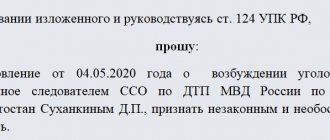A well-founded and well-drafted complaint against a judge may lead to disciplinary action against the judge, up to and including termination of his powers. But the decision made by such a judge in the case cannot be reversed.
A court decision after considering a statement of claim, an application for issuing a court order or an application in a special proceeding is appealed in a special manner - appeal, cassation, or supervision. The court's rulings on the case, whether it is the return of the claim, leaving without progress, etc., are appealed by filing a private complaint.
Therefore, a complaint against a judge is a tool with which you can draw attention to a judge unworthy of the high rank. If the process of considering the claim is not completed, try to challenge or suspend the consideration of the case until a decision is made on the complaint against the judge.
:
Complaint against a judge
Private complaint: general provisions
The magistrate is a court of first instance, which is competent to consider the following issues (Law No. 188-FZ of December 17, 1998):
- issuance of court orders;
- divorce in the absence of disputes between spouses regarding the upbringing and residence of minor children;
- criminal cases under articles where the maximum punishment is no more than 3 years;
- division of property, the total value of which does not exceed 50,000 rubles;
- consumer rights protection disputes with a claim value of up to RUB 100,000;
- administrative offenses.
Even the most qualified judge can make a mistake. The official's decision is appealed to a higher authority.
But the legislation provides for the opportunity to appeal not only the final verdict, but also interim determinations during the period when the case is still under consideration in the first instance. For this purpose, a private complaint is filed.
Against the decision of the magistrate, it can be submitted to the district court (Article 331 of the Code of Civil Procedure of the Russian Federation). The term “private” means that a decision on a specific issue or a separate judicial action is being appealed. It is contested if it may create obstacles to an objective consideration of the case.
A petition can be filed only in cases where this is provided for by the Code of Civil Procedure of the Russian Federation within the period established by law. If time is missed for a valid reason, then you must write an application to reinstate the deadline.
Filing a private complaint is allowed only in cases where an appeal against a court decision is possible.
Grounds for filing a private complaint
You can submit an application for the following definitions:
- impeding further progress of the case;
- making corrections to court decisions (Article 200 of the Code of Civil Procedure of the Russian Federation);
- on decisions to secure a claim.
The following interim rulings by the judge may be grounds for a private complaint:
- on transferring the case under jurisdiction for consideration to another department (Article 33 of the Code of Civil Procedure of the Russian Federation);
- on consideration of newly discovered circumstances that may affect the result;
- on the issuance of duplicates of court documents (Article 430 of the Code of Civil Procedure of the Russian Federation);
- to cancel the court order;
- on suspension of proceedings (Article 218 of the Code of Civil Procedure of the Russian Federation).
Other grounds include leaving the claim without progress, returning the application, and distributing legal costs. The deadline for filing a petition is 15 days after the ruling is made (Article 332 of the Code of Civil Procedure of the Russian Federation).
A private complaint cannot be filed on the following grounds:
- challenge of the judge, secretary, prosecutor participating in the meeting;
- method of consideration of the case;
- appointment of additional research and examination;
- making adjustments to the minutes of the meeting.
Reference! Determinations on these grounds can be appealed through an appeal against the court decision.
What difficulties should you expect?
Even taking into account that the reasons for a complaint must comply with current legislation, there are a number of other nuances that often stop people from filing a complaint. One of these is that in your complaint you do not have the right to demand certain sanctions or other punishment for the judge. Contrary to the expectations of many citizens, when assigning responsibility based on the outcome of the review, the opinion of the person whose rights were violated is not taken into account.
Another feature can rightfully be considered the fact that when conducting an investigation by the Qualification Board of Judges, first of all, not the norms of legislation, but labor practice will be taken into account. This is primarily due to the fact that the legislation provides only general concepts that are extremely difficult to apply to a specific violation. For this reason, there is a chance that even if there is a fact of a gross violation, the judge may be found not guilty and the complaint rejected.
Info
There are cases when citizens filed complaints against the actions or inactions of a judge, suggesting the cancellation of his decisions. In fact, this will not in any way affect the already completed trials, nor will it change the legality of the decision made. In order to challenge the decision made by this judge, you will need to file an appeal.
The procedure for filing a complaint against a decision of a magistrate judge
How is indicated in Art.
333 Code of Civil Procedure of the Russian Federation. It is sent to the district court through a magistrate judge, who hears the case. After receiving the petition, the official sends copies of it to all persons interested in the case. In this case, a reasonable period is assigned during which the parties can submit written objections to the complaint and evidence of their innocence.
The petition may be considered without the presence of persons participating in the case.
An exception is made for complaints on the following grounds:
- suspension or termination of proceedings;
- enforcement or refusal of a court decision made by an official of another state;
- cancellation or refusal of it by decision of the arbitration court;
- review of the case due to the emergence of new circumstances;
- recognition or refusal of a foreign court decision.
A private complaint must be considered within 2 months after its receipt and registration. In some cases, one of the parties or a third party interested in the case may be invited to the meeting and notified of the date and place of the meeting. This may be necessary if additional evidence or testimony from participants in the process is required.
Summoning interested parties to consider a private complaint is the right, but not the obligation, of an official. If all the circumstances are clear, then the meeting is held without the presence of the plaintiff, defendant or witnesses participating in the process.
Filing a private complaint is not grounds for postponing or canceling hearings on the main case. Court proceedings may take place in parallel with the consideration of an application to protest against a judge’s decision.
Requirements for the behavior of a judge
The basic requirements for the professional behavior of Russian judges are spelled out in the same Federal Law “On the Status of Judges in the Russian Federation”, as well as in the Code of Judicial Ethics:
- A judge is obliged to strictly observe the Constitution of the Russian Federation, federal constitutional laws and federal laws;
- A judge must avoid anything that could diminish the authority of the judiciary, the dignity of a judge or raise doubts about his objectivity, fairness and impartiality;
- A judge does not have the right to evade consideration of applications, petitions and complaints received by him or to otherwise refuse to perform his professional duties;
- In the event of a conflict of interest, the judge is obliged to recuse himself or notify the participants in the process about the current situation;
- A judge does not have the right to fill other government positions, state or municipal service positions;
- A judge may not belong to any political parties or financially support such parties;
- The law prohibits judges from engaging in entrepreneurial activities, either personally or through proxies;
- The judge is also prohibited from making public statements on an issue that is the subject of consideration in court until a judicial act on this issue enters into legal force;
- In addition, a judge does not have the right to use, for purposes unrelated to the exercise of the powers of a judge, means of logistical, financial and information support intended for official activities;
- Disclosure or use of official information received in connection with the exercise of the powers of a judge is not permitted;
- A judge should not use his official position to obtain personal advantages in civil law relations;
- A judge should not use his status to obtain any benefits, services, commercial or other benefits for himself, his relatives, friends, acquaintances, etc.;
- A judge is strictly prohibited from receiving remuneration not provided for by the legislation of the Russian Federation from individuals and legal entities;
- Gifts received by a judge at protocol events or during official business trips are recognized as federal property or the property of a constituent entity of the Russian Federation and are transferred to the court.
Sample private complaint
A sample private complaint against a magistrate’s ruling contains the following information:
- name of the authority to which the petition is sent;
- information about the applicant (full name, residential address);
- circumstances of the case;
- information about the official against whose determination the complaint is being filed;
- please cancel the determination.
The document is certified by a personal signature. The date of compilation is indicated on it. A private complaint under a court order must contain the details of the document.
If the application is not submitted on time, then an application to restore the deadlines is necessary. The procedure for its execution and submission is regulated by Art. 112 Code of Civil Procedure of the Russian Federation.
Download a sample private complaint against a magistrate's ruling
When submitting an application, the following conditions must be met:
- The petition is sent to the court where it was originally supposed to be considered.
- Simultaneously with the application for restoration of deadlines, it is necessary to file a private complaint.
- The court must recognize the reasons for missing deadlines as valid.
Interested parties are notified of the date and place of consideration of the application. Their failure to appear is not a reason to postpone the meeting. The application may be considered without the participation of interested parties, but they are notified of the results in writing.
The court's decision to restore the term or refuse to do so may be appealed on appeal. To do this, the parties are given 30 days from the date it comes into force.
Attention! state fee for filing a private complaint.
How to properly file a complaint?
A claim regarding unlawful actions of a judge is drawn up in free form in compliance with the general rules:
- in the upper right corner indicate the name and full name of the head of the authority to which the complaint is being filed;
- the main text sets out the circumstances that led to the complaint (date and time of the trial, personal data of the applicant, full name of the presiding judge, essence of the case, violations committed by the judge);
- After presenting their arguments, they communicate their demands (to challenge, conduct a disciplinary investigation, call for accountability, etc.).
A complaint can be sent to the qualification board using an interactive form on the authority’s website by filling out all the required fields.
They support the claim with evidence - links to witnesses who can confirm the substance of the complaint, photo, audio or video documents (if available).
Where can I get a sample complaint?
There is no single form of complaint. A citizen can draw up a complaint in a free format in compliance with the requirements for official documents - the mandatory presence of details (addressee, full name and passport details of the applicant, list of attached documents, handwritten signature and date of filing the complaint).
5 subtleties of obtaining compensation for moral damage
To know
5 points for returning a gift through court
Look
Grounds for partial or complete cancellation of a determination
The ruling of the magistrate may be canceled on the following grounds:
- lack of proof of circumstances relevant to the consideration of the case;
- violation or misuse of procedural rules;
- discrepancy between the official’s conclusions and the circumstances of the case;
- incorrect definition of circumstances, which led to incorrect conclusions.
Violations of procedural law are grounds for canceling a determination only if they can lead to incorrect conclusions and the adoption of an incorrect decision based on the results of the consideration of the case.
Basic principles of professional conduct of a judge
Today, Russian legislation identifies three main principles of professional conduct of judges:
- The principle of independence - when considering a case, the judge is obliged to adhere to an independent and impartial position in relation to all participants in the process;
- The principle of objectivity and impartiality - when performing his professional duties, a judge must be free from any preferences, prejudices or bias;
- The principle of equality - when performing duties, a judge must treat with equal attention all participants in legal proceedings, regardless of their gender, race, nationality, language, origin, property and official status, place of residence, attitude to religion, beliefs, membership in public associations, and also other circumstances.
Differences between a private complaint and an appeal
A private complaint and an appeal have the following differences:
- In the first case, the application is submitted for a ruling, and in the second, for a decision of a judge in a civil case.
- You have 15 days to file a private complaint, and up to 1 month for an appeal.
- An application to a higher authority may be filed against a decision made after consideration of the case on the merits. A private complaint is filed regarding procedural actions that interfere with this.
In both cases, the procedure, terms and rules for considering the petition are regulated by the Civil Procedure Code of the Russian Federation. In judicial practice, there are different results of consideration of a complaint.
They depend on the arguments presented and evidence of the applicant’s innocence. Any participant in the process may be invited to the hearing to consider the petition if his presence and testimony can clarify the circumstances.
A private complaint is filed by the plaintiff or defendant against a decision of the magistrate. The petition is sent to a higher authority. The application must indicate the grounds for canceling the determination. If necessary, you can attach evidence. The grounds for a private complaint are circumstances that prevent the consideration of the case on the merits and the making of an objective decision. The application is considered within 60 days after registration in the court office. The official is not obliged to notify the participants in the process about the date and place of the meeting.
What can the President of the Court do?
Violation of established procedural rules, principles of legal proceedings, as well as the code of ethics for judges may result in disciplinary action. As for the benefit of such a moment for a participant in the case, this is a reason to challenge the judge. Perhaps another judge will be more attentive to the process and the parties' arguments. Proof of procedural violations committed is a reason for reviewing decisions and the case. Therefore, it is very important to file a complaint during the legal process - it is strategically more correct. After the process, it makes sense to complain if an appeal is planned.
Separately about the punishment of judges
The responsibility and punishment of judges is determined by the law on their status (Federal Law No. 3132-1 of June 26, 1992); in accordance with the provisions of this law, the following sanctions can be applied to a guilty judge:
- Comment.
- Warning.
- Termination of powers.
The judge can determine the punishment only within six months after consideration of the appeal. The maximum sentence can last no more than 2 years.







